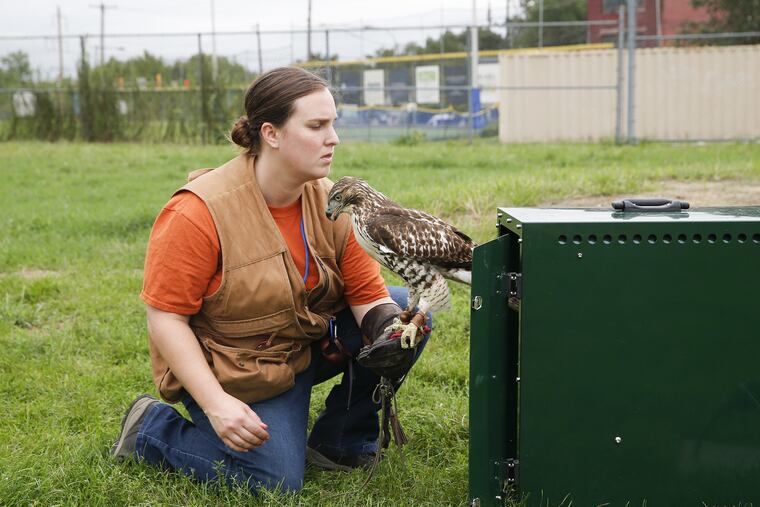Buying frozen rats in bulk and Netflix with a hawk: The life of a falconer in Philly
Falconry requires a lot of time and training but for those bird lovers, it's worth it.

It took Courtney Douds longer than she expected to trap her red-tailed hawk this year. In August, she set out in her car with a wire trap and a gerbil as bait, driving north, then west in search of the bird that she would hunt with this fall and winter. Six fruitless trips later, Douds finally spotted a juvenile female on top of a telephone pole.
"It took two tries, but I got to take her home with me," Douds said as she fed the hawk a piece of rat.
The hawk — now named Addy, short for Atalanta, a huntress in Greek mythology — wolfed down the treat — her prize for flying to Douds' leather glove when called — and shook her feathers. Her gaze was as sharp as her beak.
Addy will live with Douds in the yard of her West Philadelphia home for the next few months until spring, when she will be released back into the wild. During fall and winter, the hawk will accompany Douds on hunting trips, which can last for hours because birds go after what they consider tasty. Douds frequently returns home with squirrels, rabbits, and mice. Many falconers wind up feeding the bird what it catches instead of consuming it themselves.
While hunting, Addy flies freely until she dives for prey on the ground. It's then Douds' job to track the bird down and call it back to her glove using morsels of food that Addy prizes highly.
Douds is one of 62 licensed falconers in Southeast Pennsylvania. Falconers, who train birds of prey to hunt animals such as rabbits, mice, and smaller birds, are considered hunters and are overseen by the Pennsylvania Game Commission. In order to hunt in the state, falconers must go to fields open to the public or get permission to hunt on private property.
"I became obsessed with falconry when I was 12 after watching The Royal Tenenbaums," Douds, originally from South Carolina, said. Inspired by Richie Tenenbaum's love of his falcon, Mordecai, she began reading about falconry. "The more I read about it, the more interested I was. I wanted the hunting piece as well. I just sought out every chance I could to be around birds of prey."
Douds worked in wildlife sanctuaries before formally pursuing falconry. In order to obtain her license, she apprenticed with a licensed falconer for two years — a common requirement in most states that permit falconry — and cared for a bird for 12 consecutive months. In order to become an apprentice, you have to contact the Game Commission for a list of licensed falconers or go through a local falconry club. Apprentices accompany licensed falconers on hunts to learn the ropes and eventually begin caring for their own birds under the supervision of the falconer. After two years, apprentices can test for their full license.
Douds also built an outdoor enclosure, which was checked by the Game Commission, where her birds stay when they're not in her house. (Pennsylvania also requires falconers to pass a written exam.)
Falconers work with either birds raised in captivity or trap wild birds, as Douds does. She prefers to release them at the end of the hunting season, but it is illegal to release birds raised in captivity. After trapping Addy, who is now about four months old, Douds spent a week getting her used to working with her by keeping the bird in the house and feeding her bits of rat.
"We watched a lot of Netflix that first week," Douds said. "I'd put a towel down on the sofa for her poop and we hung out a lot."
(Addy and Douds worked their way through all of Rick and Morty, as well as Star Trek: The Original Series.)
Cheri Heimbach of Williamsport, Pa., has been working with raptors for 38 years. During the six-month season, she tries to go hunting three to four times a week.
"In order to be a falconer, you have to be physically fit," Heimbach said. "You have to be prepared to go into the fields and the woods. Birds need care 365 days a year. They're not like a rifle you can put away after hunting season."
After trapping a bird, falconers must teach it to come when called by rewarding it with lots of food. Douds said she recently bought 80 frozen rats from the Hamburg Reptile Show for Addy for training purposes.
"They're kind of just chilling in my freezer, next to the Hot Pockets," Douds said with a laugh. "I have to gut them individually and chop them into tiny pieces to reward her during training sessions."
Getting a bird to work with you so closely is no easy task. Heimbach said training the bird to come back to you reliably takes great patience, and even then, falconers run the risk of their birds taking off and not coming back on every hunt.
Douds said she expects to be able to take Addy on a hunt in another week or two. During the season, she weighs Addy frequently to make sure she's lean enough to go hunting, because the hawk won't chase prey if she's not hungry. Out in the field, Douds has to be incredibly vigilant so she knows where to go once Addy takes prey down. There's also a level of risk involved — bigger animals can seriously hurt the birds. But to her, all the work is worth it.
"Something about it is so captivating," Douds said. "I get such a rush from going out in the field and watching the hawks hunt the way they usually hunt in the wild. We just get to be a part of it."